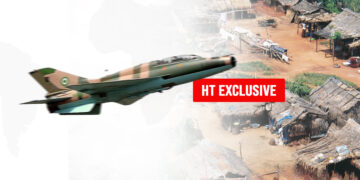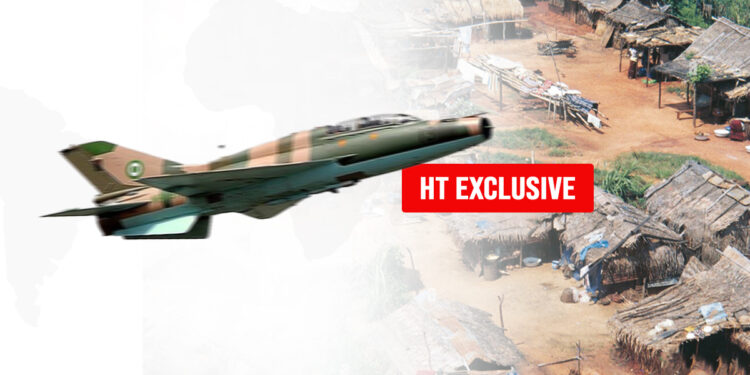By Emmanuel Nduka and Enyichukwu Enemanna
Nigeria’s military has admitted that it “mistakenly” bombed a village in the Tudun Biri of Igabi Local Government Area in Kaduna State, killing at least “30” civilians. Some news platforms have reported over 100 dead. The National Emergency Management Agency (NEMA) in a statement on Tuesday, said “85 dead bodies have so far been buried while search is still ongoing”. Amnesty International’s Nigeria office said 120 people were killed in the attack, citing reports of its workers and volunteers in the area. One incident, conflicting figures. But the deeper truth may be that the figures may have been underplayed by authorities, at least to control the narrative.
According to the Nigerian Army via Samuel Aruwan, Kaduna State Commissioner of Internal Security and Home Affairs, the Army has claimed responsibility for the air operation that “inadvertently” killed villagers who had gathered for a Maulud Nabiy celebration, but were “mistaken” for terrorists.
Aruwan who reechoed the words of General Officer Commanding One Division Nigerian Army, Major V.U. Okoro after a press briefing in Kaduna on Monday, said “search and rescue” is still ongoing, while the injured have been hospitalized. The Army admitted that the bombing was carried out by an Unmanned Combat Aerial Vehicle (UCAV), also known as a Combat Drone.
“In a meeting presided over by the Deputy Governor, Dr Hadiza Sabuwa Balarabe, which had in attendance heads of security agencies, religious and traditional leaders, the Nigerian Army explained the circumstances which led to the unfortunate and unintended attack. The General Officer Commanding One Division Nigerian Army, Major VU Okoro explained that the Nigerian Army was on a routine mission against terrorists but inadvertently affected members of the community,” Aruwan stated, on behalf of the Nigerian Army.
Who’s Accounting For These Recurring “Mistaken” Bombardments?
The disturbing recurrence of these mishaps speaks volumes of the integrity of the intelligence that is gathered before air strikes are deployed. Air operations as a sting formation of the Military, requires high levels of professionalism and tactical approaches, with heavy reliance on credible intelligence gathering and sharing.

From February 2014 till date, there has been at least 15 documented “mistaken” bombardments of innocent civilians in residential areas across Nigeria, especially in the North East and North West regions. Sadly, these mishaps have gone without anyone held accountable. Naysayers have predicted that this latest episode may just go the same way.
In July this year, more than 50 names of military officers across the three services of the Nigerian Armed Forces – Army, Navy and the Air Force were penciled down for promotion following the deadline given to top generals to exit the service. While promotions for job well done have come and gone, reprimand for careless errors that have cost human lives have not been considered.
Nigerians on X, formerly Twitter, are already smearing the incident with religious undertone, being that some of the villages mistakenly bombed, including the most recent in Kaduna, are situated in the Southern Kaduna area, where the natives predominantly Christians.
One Too Many
The fight against variegated security threats across many regions of Nigeria has undoubtedly come with unimaginable casualties against those that ought to be protected from nefarious activities of non-state actors.
Whether it is the insurgency war in the North East region, banditry in North West, separatist agitation in the South East, or onslaught against militancy and economic sabotage in the oil-rich Niger Delta region, various Nigerian communities have been at the receiving end of avoidable operational errors of the security forces. Sunday’s bombing further brings to the fore, the recurring , yet avoidable operational error.
This wouldn’t have attracted the barrage of criticism that has greeted across board if it was the first time.
In January 2017, at least 120 people were wounded and 52 killed when a Nigerian Air Force jet “accidentally” bombed an Internally Displaced Persons (IDPs) camp in Rann, Borno State.
Interestingly, the military played a vital role in the establishment of the camp which is located near the Cameroonian and Chadian borders. The bombardment also destroyed at least 35 structures housing the victims of war who had been displaced from their original settlements.
The then Director of Defence Information, Maj. Gen. John Enenche (rtd) had futilely explained that “the location was not reflected in the operational map as a humanitarian base”, hence, it appeared as a place that could equally be used for enemy activities.
Nothing could be more ridiculous than feigning ignorance of the location of an IDP camp you played a key role in establishing, in a desperate effort to justify expensive inefficiency.
In April 2022, a roaring NAF fighter jet in search of Boko Haram terrorists in the Shiroro area of Niger State dropped an explosive, covering the atmosphere with smoke as trees fell on roofs, forcing residents to scamper for safety. The aftermath of it was the killing of six children who were playing in an open place. Their parents packed up their badly torn remains, heartbroken and frustrated.
In September 2021, two military planes bombed a fish market in Daban Masara village in Borno State, killing at least 50 people instantly, including a man who barely got married three weeks before.
In January this year, a Nigerian Air Force jet yet again embarked on another catastrophic operation in Rukubi, near the Southern border with Benue in Doma Local Government Area of Nasarawa State, North Central Nigeria. Eyewitnesses said an aerial bombardment targeted at bandits left at least 47 civilians, mainly pastoralists dead.
While such errors in line of duty may not be totally out of place, its frequent reoccurrence in a country where human rights record is abysmally poor amidst global concern on how the weapons being acquired are actually used, leaves so much to be desired.
For years, the US Parliament had blocked the sale of ammunition to Nigeria over concerns about possible human rights abuses in its war against armed groups. But recently in April this year, a green light was given to buy 12 AH-1Z Cobra attack helicopters.
Air Force Denies Involvement/Army Chief Tenders Apology
The Nigerian Air Force (NAF) hurriedly exempted itself from having any hand in the incident. “The Nigerian Air Force has not carried out any air operations within Kaduna State and environs in the last 24 hours,” its Officer in charge of media relations, Air Commodore Edward Gabkwet, said, adding that “the Nigerian Air Force isn’t the only Service operating combat armed drones in the region”.
On his part, Nigeria’s Chief of Army Staff, Lieutenant General Taoreed Lagbaja while on a condolence visit to the area on Tuesday, pointed out that the troops were carrying out aeriel patrols when they observed a group of people and wrongly analyzed and misinterpreted their pattern of activities to be similar to that of the bandits, before the drone strike.
Conveying his “sincere regrets and unreserved apologies on behalf of the Nigerian Army to the District Head and people of the community, as well as the Government and entire people of Kaduna State”, Lagbaja, at least, disclosed that he has ordered a thorough inquiry into the incident to ascertain and identify areas of deficiency that led to the inadvertent disaster. But is that fair enough?
Following the incident, an emergency security meeting was convened by the Kaduna State Government, after which the Governor, Sen. Uba Sani, also ordered an investigation into what transpired.
“I appeal to the affected community, and all citizens to keep calm and continue to support the security forces and the state government in our battle against terrorists, bandits, kidnappers and other criminal elements in Kaduna State. I have ordered immediate investigation into the tragic incident,” Sani stated.




































